Brief Encounter – 1945 – Love hurts (and how)
World War 2 had just ended. Chance sexual encounters between men and women during the war were rampant, fuelled by the “tomorrow may not come at all” feeling. Some ended happily in marriage. Others sadly with as the men went missing or died during the war. But what does one do now that war is over and a new danger confronts the self – a feeling called love ? for another person to whom you are not married? Can you forgive yourself and the other for falling in love ?
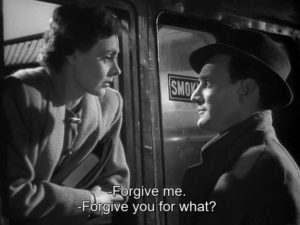
Brief Encounter is counted as one of the great classics of British Cinema. It’s truly a multi-dimensional film. It is about love. Lost love. Responsibility versus basic instincts. Falling in love versus guilt. Safety and comfort versus risk. Fate versus chance.
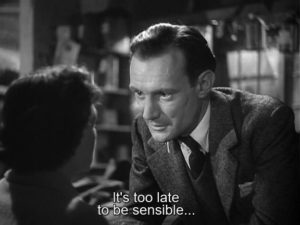
The story is simple. A happily married woman falls in love with a doctor. The chance encounter in a railway cafeteria turns into comfort, affection, and soon love. Alec and Laura’s subtle behavior contrasts Myrtle, the woman who operates the cafeteria counter, and Albert, the railway man who brazenly flirts with her, much to her displeasure and then some amusement. Laura’s guilt increases day by day, especially when she comes back home to hear the news of her son’s accident. Laura’s husband Fred is a good sort. We see him as slightly unimaginative but the film’s last scene will reveal otherwise as he is one who closes the film with “thank you for coming back to me”
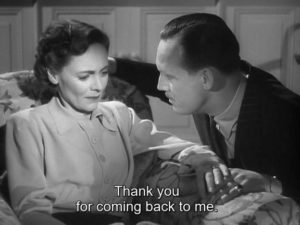
The story unfolds as a flashback through the woman’s point of view. It starts with Dr. Alec Harvey (Trevor Howard) and Laura Jesson’s (Celia Johnson) final meeting in the railway cafeteria. We know right in the beginning that the meeting is not happy as both are tense. One of Laura’s friends intrudes, and they ride back together by train. Laura starts remembering the past that led to the present. How a chance encounter leads to an innocent lunch and soon furtive behavior on her part.
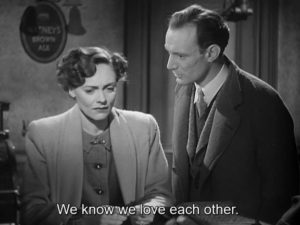
The story unfolds gently in front of us, and we start thinking – who led who? Was it a chance encounter that turned into something else? Is love and loving really so painful? Will the ache ever go away?
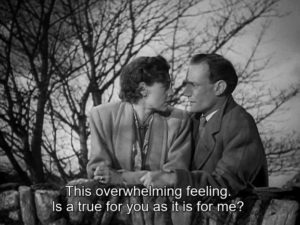
More questions and no answers
Brief Encounter is all that’s great about British cinema. Camera work in gorgeous black and white. A tight script by Director David Lean and writer Noel Coward based on Coward’s 1936 play Still Life. The black and white photography with great shadows enhances the feeling of the oncoming doom. Above all, the music.
In this case, Sergei Rachmaninoff’s Piano Concerto No.2 enhances Laura’s confusion and melancholy.
Most of the film was shot before World War 2 ended, so the contemporary look of the film is absolutely authentic. In a couple of scenes, one can spot some bombed/destroyed buildings in the background as the lovers walk toward their destination. A sizeable part of the story happens in Carnforth Railway Station, which is still an active railway station, albeit with electric trains (instead of steam trains of those times).
So, who is the culprit? Who is the victim? We don’t know. We know that both will carry these feelings for the rest of their lives. The 90-minute film still strikes a chord after 75 years, and one wonders if love can be this painful and sad.
Find out for yourself as it is free on You Tube
The film has been remade twice. The 1974 TV film Brief Encounter starring Sophia Loren and Richard Burton was poorly received. 1984’s Falling in Love had Meryl Streep and Robert deNiro getting the wrong Christmas presents and meeting in New York’s grand central. Here, trains and train journeys also serve as a metaphor as in the original, which remains the best version. That too is available on YouTube and is closer in spirit to the original https://youtu.be/xGxlpmpjN0s
Script – 5 out of 5
Story – 4 out of 5
Direction – 5 out of 5
Photography – 5 out of 5
Total – 4.8 out of 5
As usual, Well written Ramesh!
I absolutely *loved* this film, for all the reasons Rammesh sets out.
Further trivia. Celia Johnson married Peter Fleming, James Bond creator Ian’s brother. Peter Fleming was at one time a travel writer, whose books were better-known than Ian Fleming’s. Peter Fleming also served in the British Army during WW2, rising up to Lt Col, and spending part of his service in India.
Thank you, Ramesh!
On the mark about what the movie wishes to convey to the audience! The ephemeral nature of love and the gamut of emotions it strikes it’s bearers, leaving them broken (and yet somehow stronger!) by the end of it.
Another brilliant David Lean movie!
Thank you for introducing such classics.
Will certainly watch.
As always it is always a great experience to read your well researched articles and reviews.
Keep it up. Looking forward to your upcoming blogs.
Beautiful review of a lovely film.Some of the scenes the way it was picturised especially of the train passing away from the station left me spellbound.You do not know which character to feel sad for all of them caught in their own feelings and emotions.Glad I watched this film.